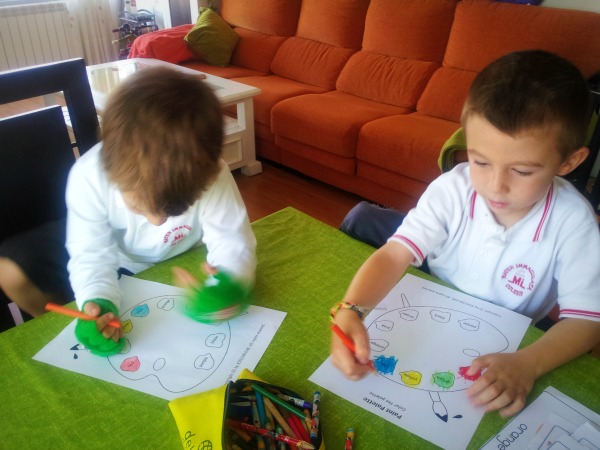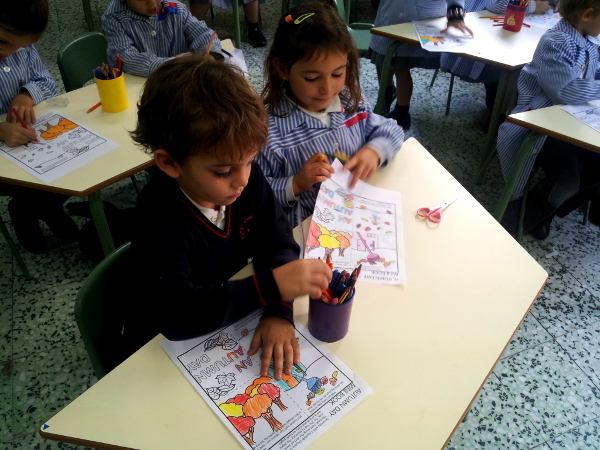Over the past year, I've had many friends, acquaintances and strangers ask me about
how to teach English in Spain and what they need to do once they arrive. Instead of copying and pasting the same email I send to everyone, I figured it would be more efficient to answer all of these questions in one comprehensive post. Teaching abroad is an experience I'd recommend to just about anyone, so why not spread the word?
Truth be told, teaching English in Spain was never in my "plan". It wasn't until about 4 months after graduation that I realized I wasn't ready to go to grad school, thus inciting the "what in the world am I doing with my life" panic that commonly afflicts recent post-grads.
That month, I traveled to South America and had a life-changing conversation with a stranger on an airplane. I was sitting next to a man who worked for National Geographic, and as we got to talking, I admitted to him that I wasn't really sure what I wanted to do career-wise, but I knew that I wanted to travel, speak Spanish, and live a life of adventure. He then suggested that I move to Spain and teach English as a second language. At first I shrugged the idea off, mostly because the idea of teaching terrified me, but not long afterwards I had a change of heart. From there, it all just kind of fell into place.
If you're a fellow victim of wanderlust with an inherent distain for 9-5 office jobs and a desire to experience the Spanish culture, then maybe teaching English in Spain is the right decision for you.
Here's what you should know about teaching English in Spain and what to do once you get there:
I teach English in Madrid through the Spanish Ministry of Education's
Auxiliares de Conversación program, also known as the North American Language and Culture Assistants Program. In Madrid, I work 16 hours per week and earn a monthly grant of 1000€/month. In other regions of Spain, you work 12 hours per week and earn 700€/month. (This is mostly due to the higher cost of living in Madrid.)
While I highly recommend the Auxiliares program, some other options include
BEDA,
CIEE,
MEDDEAS,
UCETAM and TEFL. A while back I did a collaboration with a few other bloggers about different ways to teach English in Spain, and you can read about our experiences with our respective programs here:
The application for Auxiliares de Conversación opens in early January. Assignments are placed on a first come first serve basis, so if you want your first pick of locations, be sure to apply as soon as the application opens.
Before packing my bags to teach English in Spain, I had zero experience or qualifications. All the North American Language and Culture Assistants Program requires is that:
- You're a citizen of the US or Canada
- English is your first language
- You're a university graduate by the time you arrive in Spain
- You're in good physical and psychological condition
- You have a clean background check
You aren't required to know Spanish, but it's certainly recommended. There is no age limit, except in Madrid where you must be between the ages of 21 and 35. Learn more about how to apply
here.
These requirements may be different if you're applying from the UK, Ireland, Australia or New Zealand.
Through the Auxiliares program, Americans and other native English speakers are placed in public schools to work as language assistants. ("Language assistant" is a fancy way of saying "teaching assistant", with an emphasis on facilitating English conversation). We're not supposed to run the classrooms
persay, but responsibilities can differ from school to school.
This past year I worked in a public elementary school about an hour outside the center of Madrid, where I taught an adorable group of third and fourth graders. I loved my students (and my fantastic coworkers) so much that I'm coming back to the same
colegio for a second year. I really, really lucked out with my school, but sometimes other Auxiliares aren't as fortunate.
In my third grade class, I co-taught science and English. With my fourth graders, I mostly took small groups of students outside the classroom to help them prepare for their end-of-the-year oral exam. I also helped out during arts & crafts time, taught my students several Beatles songs, and made a lot of PowerPoint presentations about Halloween, Thanksgiving and other American traditions. I was not required to write any lesson plans, but I spent about 1-2 hours a week preparing various activities for class.
Arts & crafts is both the most stressful and most entertaining part of my day
Getting Your Visa:
One of the best parts about teaching English in Spain is that it gives you a legal means to live there. The Spanish Ministry of Education grants me a student visa, which I obtained through the process detailed
here. Make sure you allow plenty of time for this process!
Once you arrive in Spain, you have 90 days until your visa expires. During this time, you must apply for your NIE and TIE (your temporary resident ID number and card). At your Auxiliares de Conversación orientation, they'll give you some more details on how to do this, but try to jump on it as soon as you can. Expect this process to go slowly, because Spanish bureaucracy is
a real pain in the ass dependably inefficient. Your temporary resident ID card will expire at the end of the school year.
Finding Housing:
Housing is not provided by the program, so it's your responsibility to find an apartment. Finding a good apartment in Spain isn't impossible, but it can at times feel daunting (especially with a language barrier). Don't let that discourage you!
I found my apartment on
easypiso.com, but most people have good luck on
idealista.com and the Auxiliares de Conversación
Facebook pages. It's important to look for a place that's furnished, has WIFI and heating. I also wanted a
piso that had an oven, a hot water heater and a balcony. When planning your budget, remember to factor in
gastos (utilities), which often aren't included in the rent.
Have realistic expectations. You won't find your dream apartment in Spain. I absolutely love my
piso, but there were several things that I had to sacrifice. I don't have a living room, a dryer or a double bed, the kitchen is painfully tiny, and my rent is rather high. But on the flipside, I live in a trendy neighborhood that's centrally located, I have a view from my balcony that's been featured on postcards, my landlord is kind and helpful, a housekeeper comes once a week to clean the common areas, and my apartment was recently renovated.
Do not put money down for an apartment before seeing it in person, because more often than not, the pictures online look
nothing like the apartment does in reality.
Consider what sacrifices you're willing to make. I was happy to pay a little extra rent for this view!
To get paid, you must have a Spanish bank account. My school deposits my grant on the first of every month, but be forewarned: other regions in Spain have had issues paying their Auxiliares on time. (Thankfully, this isn't a problem in Madrid.)
When it comes to Spanish banks, I've had really good luck with La Caixa, but my friends have had great experiences with BBVA and Sabadell. I've only heard terrible things about Santander, so I'd recommend staying away from them. I only needed my passport to open an account at La Caixa, while other banks may require your NIE/TIE.
Finding La Caixa branches in Madrid is like finding Starbucks back home in Seattle (in other words, they're everywhere), which makes life pretty easy. Don't choose a small regional bank, because they have fewer branches in other parts of Spain/Europe (which can be rather inconvenient if you plan on traveling extensively).
Using your phone in Spain:
The easiest thing to do is bring a smartphone from home, unlock it, and buy a new SIM card in Spain. Movistar, Vodafone and Orange are all good places to do this. You can pay as you go, or you can sign a contract for a year. Most people use WhatsApp instead of texting in Spain, so make sure to have internet access on your phone.
Teaching private classes:
Teaching private classes on the side is the easiest way to earn some extra cash for traveling, or maybe just for your weekly tapas +
tinto de verano fund. In Madrid, most Auxiliares charge 15-20 euros per hour for private lessons, depending on what age you're teaching and how qualified you are. You can find private classes through the
Auxiliares de Conversación en Madrid Facebook page or through
tusclasesparticulares.com.
Moving to Spain with a food allergy:
Spain is surprisingly accommodating to various food allergies. I have Celiac Disease, but avoiding gluten in Spain hasn't been a problem thanks to their general knowledge of what
"celiaca" means and the abundance of eggs and potatoes in Spanish cuisine. It's also relatively easy to avoid dairy, seeing as olive oil is almost always used instead of butter. However, vegetarians, vegans and those who keep Kosher may find avoiding meat to be a bit more difficult.
Learning Spanish:
Knowing the local language is invaluable, not only for your job but also for your life as an expat. If your Spanish skills need some brushing up, sign up for a Spanish class or attend weekly
intercambios. Intercambios are gatherings where you practice speaking Spanish and English with a native Spanish speaker. It's a great way to improve your Spanish, meet new friends, and get connected with your new community. You can find countless
intercambio opportunities at
conversationexchange.com or through the Facebook group
New in Madrid - Intercambio de Idiomas.
Travel flexibility:
Auxiliares only work four days a week. I work Monday through Thursday, which means I have three day weekends every week. This makes it incredibly convenient to travel on the weekends, especially with the availability of cheap RyanAir flights! This past year I took weekend trips to Sevilla, Amsterdam, Budapest, northern France, Munich and northern Spain. I saved my bigger trips (Prague + Vienna and Greece) for spring break and summer vacation.
But of course,
the best part about teaching English in Spain is experiencing Spain. The Spanish culture is inviting and delightful, and being able to live abroad and experience the heart and soul of this country has changed who I am & what I value. Living and working abroad is an invaluable experience, and I can say without a doubt that this past year has been the most fun year of my life.
If you have any other questions or concerns, feel free to contact me! Or, check out the other helpful resources listed below.
Buena suerte!
Update as of Autumn 2015:
I spent two years teaching English in Madrid through the Spanish Ministry of Education's Auxiliar de Conversación program. The ministry has a rule that you can only stay in the same region for two years, so you must switch regions after your second year if you wish to continue with the program. Because I had my heart set on staying in Madrid, I am currently spending my third year in Spain teaching English through the BEDA program.




































 When Jessica isn't teaching or taking advantage of cheap RyanAir flights, you will probably find her in the Asian supermarkets scouring the aisles for the best ingredients for pad thai or Korean kimbap. She also tweets and Instagrams for Madrid Food Tour where she shares food porn with the rest of the world. You can follow her journey from Asia to Europe, and everywhere in between, all on her blog
When Jessica isn't teaching or taking advantage of cheap RyanAir flights, you will probably find her in the Asian supermarkets scouring the aisles for the best ingredients for pad thai or Korean kimbap. She also tweets and Instagrams for Madrid Food Tour where she shares food porn with the rest of the world. You can follow her journey from Asia to Europe, and everywhere in between, all on her blog 






